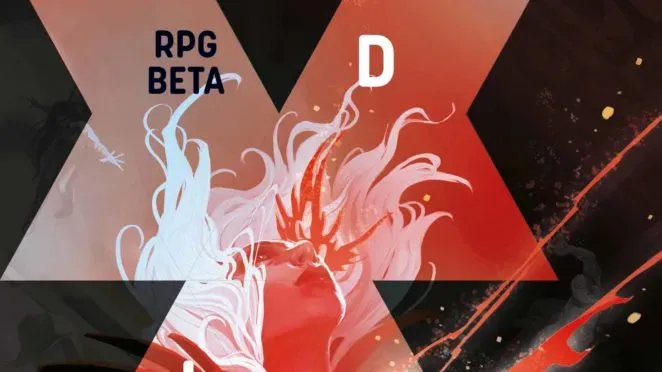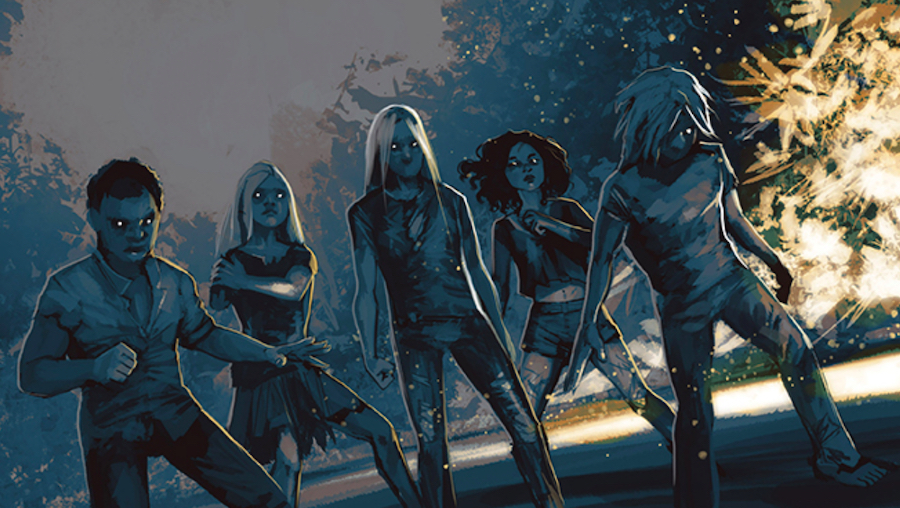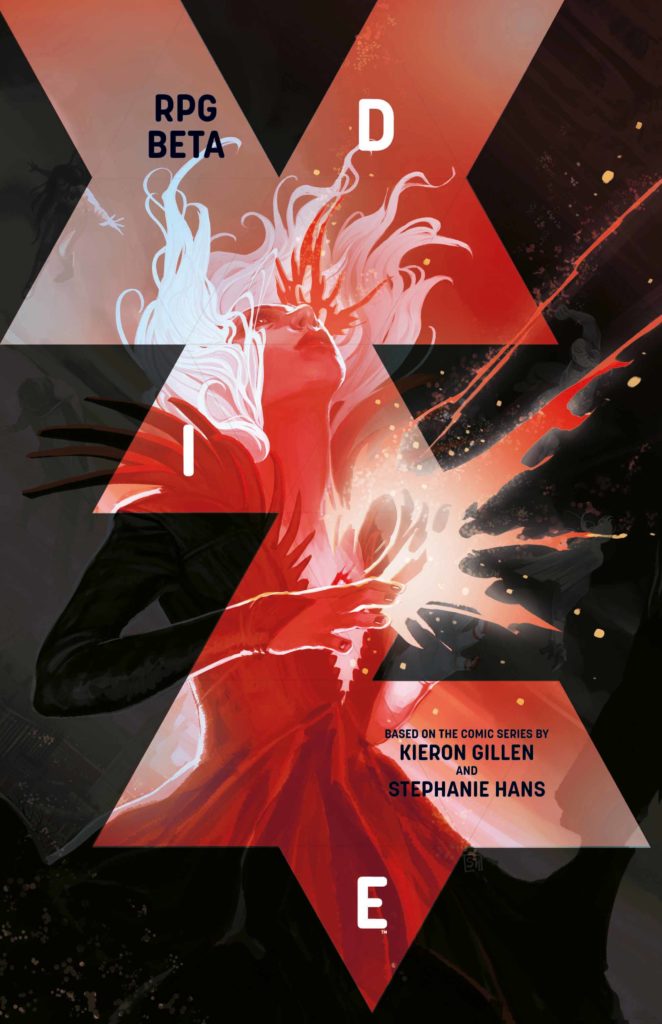Bleeding all over the table
What do we bring of ourselves to tabletop games?

I didn't even realize the trap I had wandered into until it was already sprung.
I had joined a game of the tabletop RPG DIE, which is based on the (excellent) comic of the same name. It was with a few people I'd never met or played with before from a TTRPG discussion Slack I'm in. (Yes, I'm in a TTRPG discussion Slack. Transition has only made me nerdier.) I had been longing to try DIE for a while, both as a fan of the comic and as someone deeply curious about its central conceit. The game is currently in beta, which means anybody can try it out if they're so inclined. You can find the PDF and other stuff here.
It's probably best to go into DIE as a player unspoiled (unless you've read the comic, in which case you know exactly what's going to happen). There is a central idea here that is delicious and intriguing, and I can imagine how wonderfully it would unfold if you had no idea what was coming. To be clear: As a fan of the comic, I knew exactly what was coming when I played the game, and it might have been the single best TTRPG experience I've ever had, so I wouldn't worry about spoilers, but you might.
It's impossible to describe the game without spoiling its central idea, so I'm going to do that in following paragraphs. (I'll mark when it's safe for the uninitiated to come back.) Suffice to say: DIE encourages player bleed, which is to say that it all but asks you to bring your own bullshit and vulnerability to the table. It is daring you to form intimate bonds with your fellow players, who often might be people you've never met. It is asking you to trust them and them to trust you. And then it grabs hold of those bonds and tugs at them painfully.
SPOILERS FOLLOW!

The comic DIE is about a group of friends who used to play a homebrew role-playing game as teens. They were sucked into the world of the game, and then they returned after a few years. But the comic picks up well after that happened, when the former teens reunite as adults. They play the game again, then are returned to the game world, where they explore all of their trauma and emotional baggage. And all the while, the characters they're playing are specifically designed to play off the things about themselves they'd rather not look at. It's a brilliant conceit, taking Jumanji and making it about angst.
The RPG does basically the same thing. You set up a group of people who played a game together as kids, then catch up with them again as adults. Only now, as adults, they're riddled with regrets and might-have-beens. Me being me, I decided to just make my character explicitly trans. She had been a bright and shining "good boy" in the church group that brought all of the players together as teens. She was now mayor of a small Cleveland suburb with higher political ambitions. She had married a fellow player in the group, a bad-girl-turned-good. The two were talking about having kids. My character really wanted them, if only to cement her image as a good family man. Her wife seemed deeply indifferent. But also, it was clear that the more enmeshed my character became in her political career, the harder it would be for her to ever self-accept. She had an egg of steel that would never crack without taking a mallet to it
And yet... I decided she had always played a girl in the RPGs she played as a teen, so she would as an adult, too. She would revisit "Megan, the Wayward Girl," the character she had played as a teen. Getting sucked into a game world where she would become Megan, whom I described as looking like "Taylor Swift, if she were a character in The Witcher," would surely be a mallet to her shell. And it was.
I was surprised at how easily Megan's journey from egg of steel to cracked egg to self-acceptance came to me, complete with a stop in, "Oh, God, this feels so good, I need to make it stop at any cost!!!" town. But of course it came easily to me. It was my own journey. If I had suddenly become one of the many (many, many) woman characters I had played in TTRPGs over the years, you would have had to drag me forcibly out of the world I had been sucked into, no matter how crappy. I would have abruptly felt alive, with all the good and bad that cam with that.
Which brings me back to the trap.
The GM, who was also playing my wife (because the GM is a character in the game, while also handling the other typical roles of a GM), brought our little party to a city at the edge of a vast lake. There, we met a 9-year-old orphan girl who immediately tried to run a grift on us. I tried, first, to get rid of her, but she hung around us like she knew we were her meal ticket. Finally, I snapped at her that if she wanted a mom, I would be her mom, and then she didn't just follow the party around. She followed me around.
And just like that, I had a daughter. And just like that, DIE had taken me from playing out an arc I explicitly wanted to play out — I'm a trans girl! — to one I didn't even realize I was going through in my own life. I wanted to be a mom. And I maybe wanted to be a mom through adoption.
I thought maybe this was a pure coincidence, something that had happened in play organically. But no, the GM assured me, that girl had been there to pluck at that particular idea I had introduced in our character brainstorming. It was up to me to invite her into my heart, but once I did, she was there to say. It's been weeks since we played, and I still can't shake her.
THE SPOILERS ARE GONE
Player bleed is a topic no two tabletop RPG players will agree upon. I am someone who all but encourages it at the table. I've never created a character who wasn't an attempt by me to grapple with some weird thing I was going through. Because I am a writer, I find it hard to explore fictional worlds without bringing giant, meaty hunks of myself into them. And when I GM, I always look for the most emotional, most raw stuff my players introduce in brainstorming and try to find safe ways to introduce it into the story.
I benefit from primarily playing with people who play lots of story games and indie RPGs, where this kind of emotional exploration is much more commonly encouraged than it is in more mainstream games (though Lord knows I will take any D&D campaign I'm in and turn it into an excuse to dig down into my particular weirdness). I also benefit from playing with people who have lots of experience utilizing safety tools that are designed to stop games from going to triggering or traumatic places long before we get there.
So I don't want to say my affection for player bleed is unusual. I think a lot of TTRPG fans enjoy exploring their inner selves in a fictional setting, with the guardrails of game mechanics to guide them. There is a reason trans gamers using games to explore their gender identities long before self-acceptance is a trope. It's just inevitable that you will find yourself giving over more of yourself than you expected when you sit down to play.
But there's a huge danger in player bleed, too. When you invest yourself into a character, you can end up feeling like the character is you, which can make it hard to portray that character's weaknesses or to give yourself over to the fiction in a way that is satisfying for the other players. When the boundaries between your fictional self and your actual self start to dissolve, you can become so invested that the story ceases to be about the group and starts to be about yourself. There's a balance between giving up just enough of yourself without giving yourself away entirely, and it's very easy to screw that balance up.

Plus, there are a lot of players who don't want to use games to explore darker or more difficult topics, who enjoy having the escapism of a game without having to worry about, like, a random encounter realizing how raw and complicated their desire to be a mother has become. When you let yourself bleed into your character, you might open up doors inside of yourself you're not ready to open. I can't stop thinking about being a mom, for instance, but I'm at least a year or two away from being able to make that a reality. Discovering this longing inside of myself was good in the long-term, but it's only made that longing harder to bear in the short-term.
But I tend to think a longing for the escapism of, say, a dungeon crawl, where players clear room after room of monsters with little time for character interaction or role-playing, is in and of itself a form of player bleed. Don't so many of us wish the world was simple and bounded by rules we can easily understand? Wouldn't it be nice to be so powerful that any problem could be solved with the right weapon? Why can't all of our problems be boiled down to a few good dice rolls?
This is to say: Player bleed is inevitable, and even trying to avoid yourself entirely becomes a kind of confrontation with yourself. What don't you want to look at? What monsters are in your own dungeon?
The question of player bleed intersects with the other players at the table, too. How willing you are to be vulnerable is directly tied to how much you trust the other players to build a space where that sort of intimacy is possible. And the circumstances under which that might happen are almost unpredictable. I've played in games with great friends that, nevertheless, failed to go anywhere too vulnerable or intimate. I've played in games with complete strangers that went to places that left me feeling a bit exposed (like that DIE game).
I increasingly think about tabletop RPGs as having similar dynamics to TV writers rooms. They're both spaces that are helped by the presence of intimacy and vulnerability but also spaces where those qualities leave lots of room for gross emotional manipulation. And there's such a thing as too much intimacy in those spaces, too. If everyone around the table can anticipate everyone else's every thought, then there's no room for the spontaneity and surprise that marks great storytelling. You have to have room for the unexpected, and the unexpected often leaves the room when everybody knows each other extremely well.
But as surely as there are hundreds of stories of showrunners turning the emotional vulnerability in their room into an excuse to terrorize their employees by creating an abusive environment, there are so many stories about GMs who turn their groups into excuses to work out their own psychological issues. (Here's a whole Subreddit devoted to them!) Telling stories communally requires trust, but in any scenario where trust is on the line, abuse of that trust becomes far too common.
When we tell stories together, it's natural to be a little afraid of bleeding all over the table, but that space is where the best stories are told. In that sense, the question of what we call "player bleed" isn't about the individual but about the community. We can bleed quite a bit if we know someone will be there to stanch up the blood and stitch us back up. And we can bleed even more if we know the others here with us are all donors. And so on.
What would happen if we stopped thinking of stories as bolts of lightning that hit certain blessed people in the brain and started thinking of them as sparks of static shock, passed from person to person, changing and flowing with everyone who is added to the change? What if it's not authorship that makes stories inevitable but the simple existence of a story to begin with? What if we aren't authors but conduits?
I don't know. But I'm going to keep playing until I find out.
Talk back to me: What are your great stories of when "player bleed" turned a game into something amazing? You can talk about board games or video games or sports, even. This isn't a phenomenon unique to TTRPGs, though that's the place where I first encountered the term.
What I've been up to: This week at Vox, I checked in on the (AMAZING!!!!) season finale of For All Mankind. But more importantly, I wrote about Taylor Swift. It's a piece that starts out being vaguely analytical and then ends up being about how I'm a weird, overly emotional stan. So it's an Emily VanDerWerff piece.
When Swift began the process of re-recording her old songs, I was entertained by the thought of her foiling the plans of the much-loathed music exec Scooter Braun, but I also wondered if there was really so much to gain from revisiting this music, to make it worth the time and effort she might otherwise invest in making new stuff. (Swift, who released two albums of new music in 2020, can clearly do both at once, so who knows what I was worried about.)
Now, I’m all in. Fearless (Taylor’s Version) is both a terrific album in and of itself and a fascinating document of a woman accidentally exposing herself in the process of trying to literally recreate who she was more than a decade ago. After hearing it, I’ve come to view Swift’s re-recordings as one of the most captivating creative projects across all of American pop culture right now, and I can’t wait for more. The songs haven’t changed, but the singer has. (Taylor, if you’re reading this, and if I may be so bold as to call you “Taylor”: Do Speak Now next? That album is super underrated.)
Also: Check me out on the podcast Cows in the Field, where I talked about the movie Midsommar and being trans.
Read me: What do you think about MARVEL? What do you think about KISSING? Joshua Rivera has CONSIDERED BOTH OF THESE THINGS for POLYGON. It is GOOD.
At some point during Disney Plus’ miniseries WandaVision, which is expressly focused on a romantic relationship, I started to wonder: How often do characters actually kiss each other in the MCU? PDA isn’t entirely lacking in the franchise; Tony and Pepper kiss plenty, and Thor kisses Jane Foster — but looking back on so many hours of action movies without so much as the faintest hints of romance, it began to feel like the MCU avoids even the tamest signs of affection. These are action movies built around big exciting fights, not characters racing dramatically to airports to confess their feelings to each other. (Perhaps the MCU should have a few of those scenes. Just an idea.)
So I set out to learn not merely how many kisses are in the MCU, but why people kiss in the franchise. The answers are surprising — when you ignore everything else in these movies and shows, and only pay attention to the kissing, you start to discover how conservative MCU romances are, and wonder whether the people kissing even like each other all that much. (Very few good kissers in these movies. Thor might be the best at it.)
Watch me: I finally finished Neon Genesis Evangelion (and its alternate finale movie End of Evangelion) earlier this week, and I am almost too emotionally overwhelmed to say anything about it, though I'm sure I will someday. Until then, check out this wild attempt to pull all of the NGE spinoff merch into a consistent timeline. It seems like a lot of work for little payoff, but hey, who am I to judge?
And another thing... If you like reading stuff about RPG theory and RPG criticism and so on (and I do!), then please do check out the Indie Game Reading Club, run by Paul Beakley, who was in the aforementioned DIE game. I don't always agree with Paul, but he's very thoughtful about what makes RPGs tick, and I've learned a lot from reading him and interacting with him.
Opening credits sequence of the week: Friends, can I interest you in some Fish Police??
A thing I had to look up: I just rewatched the Fish Police credits and wondered why they had a "developed by" credit but no "created by" credit, and it turns out it's because the series was based on a comic book. For whatever reason, the show seems to be trying to downplay that. Also: Did you know Hanna-Barbera made Fish Police?!
This week's reading music: "Komm, Süsser Tod" by Arianne
Episodes is published three times per week. Mondays feature my thoughts on assorted topics. Wednesdays offer pop culture thoughts from freelance writers. Fridays are TV recaps written by myself. The Wednesday and Friday editions are only available to subscribers. Suggest topics for future installments via email or on Twitter. Read more of my work at Vox.



